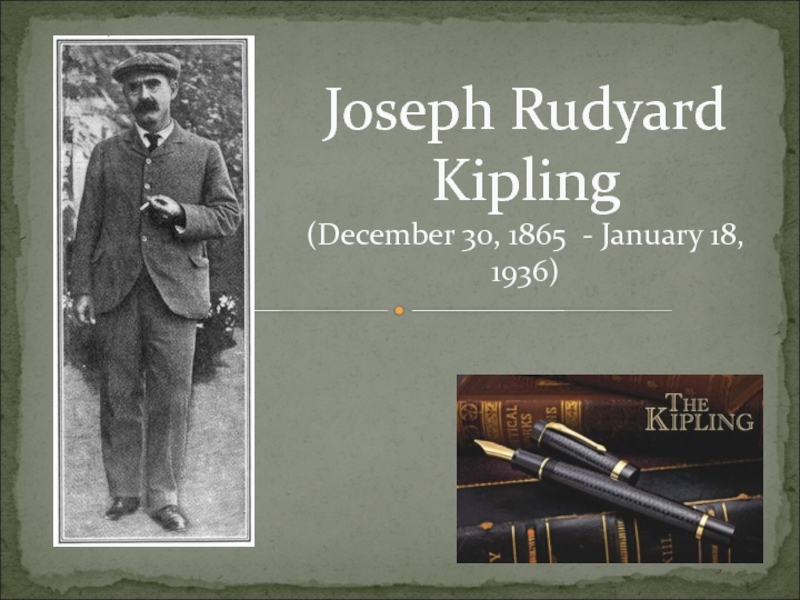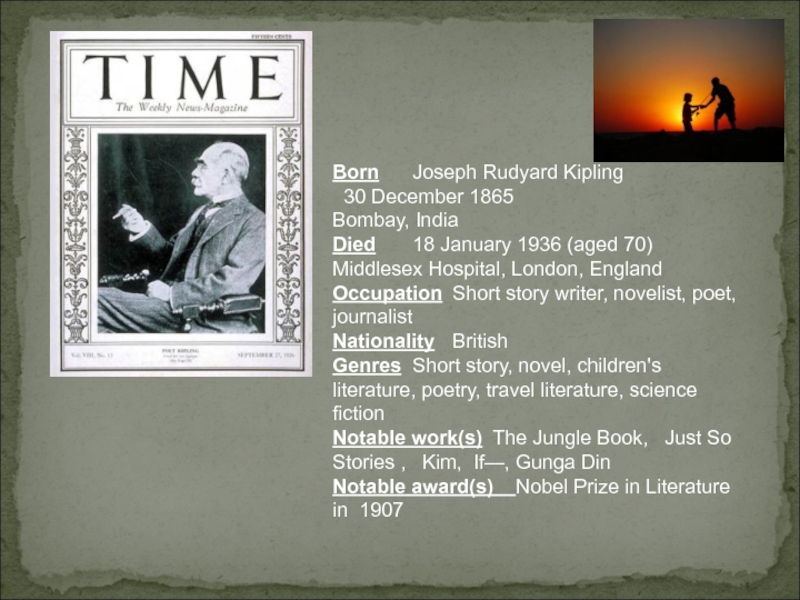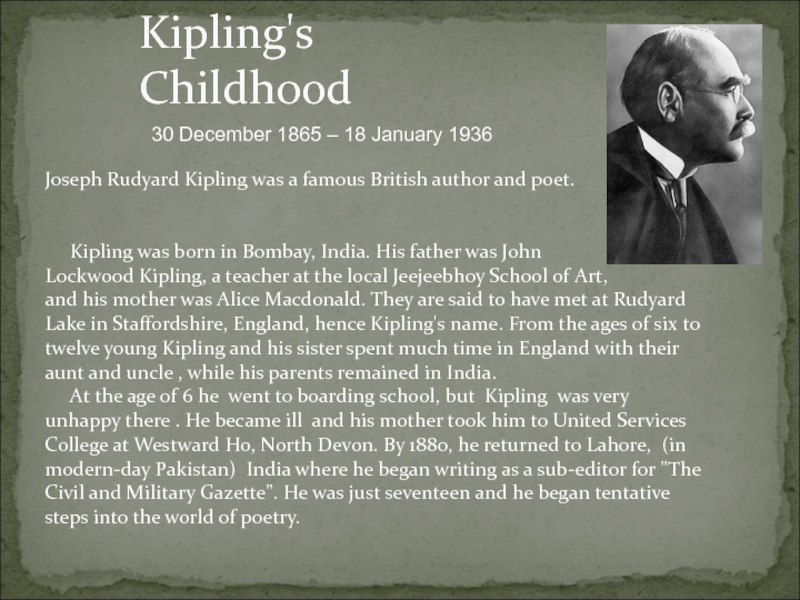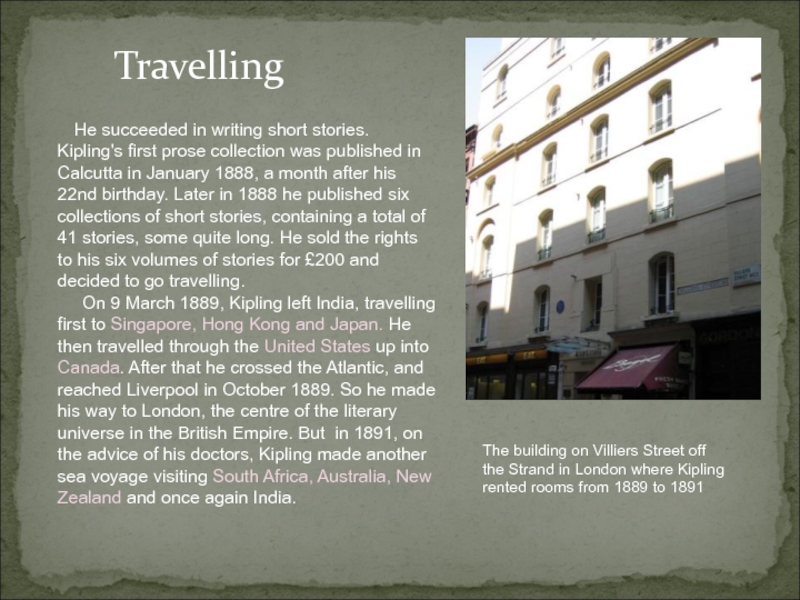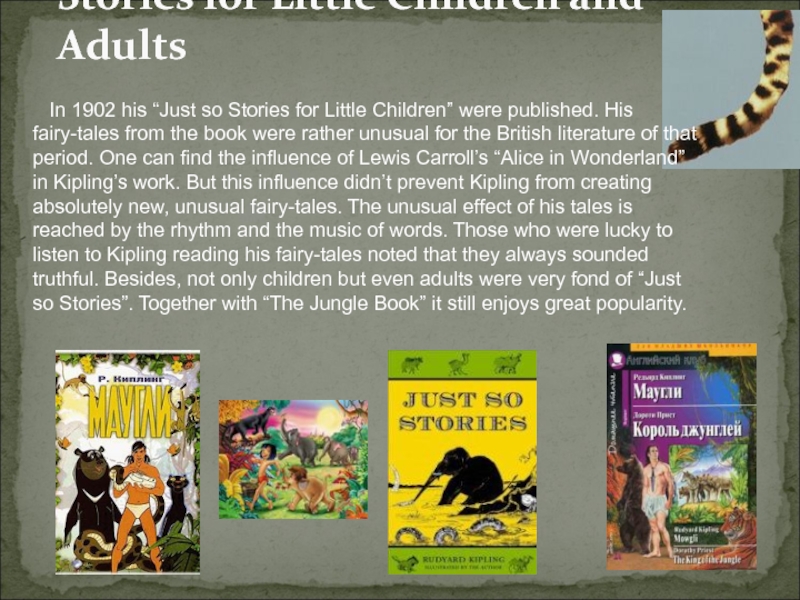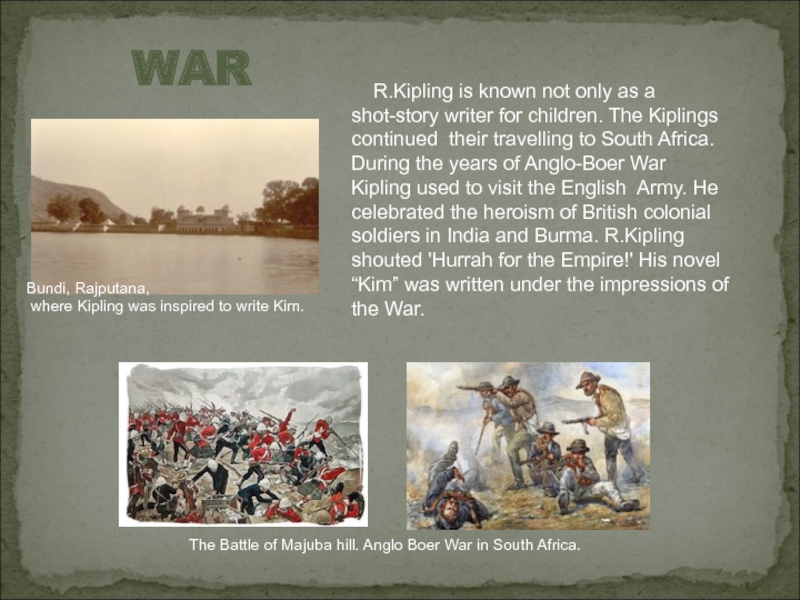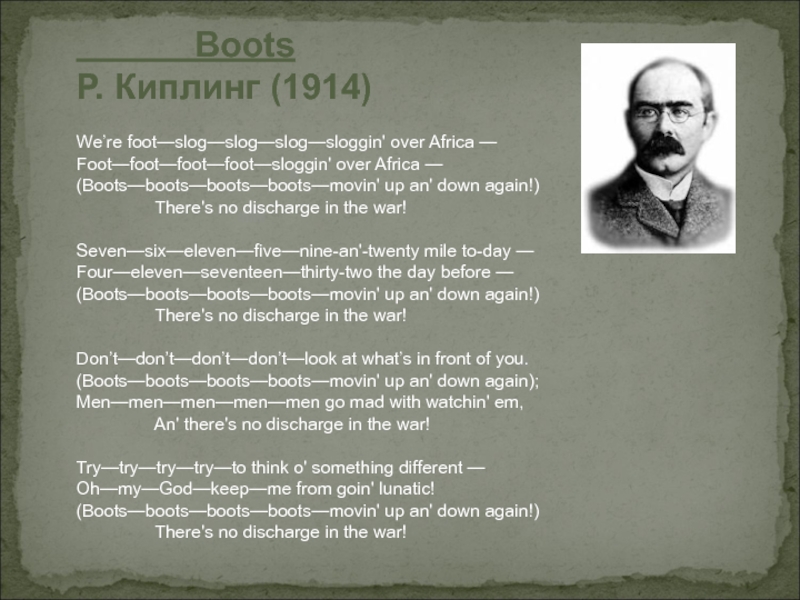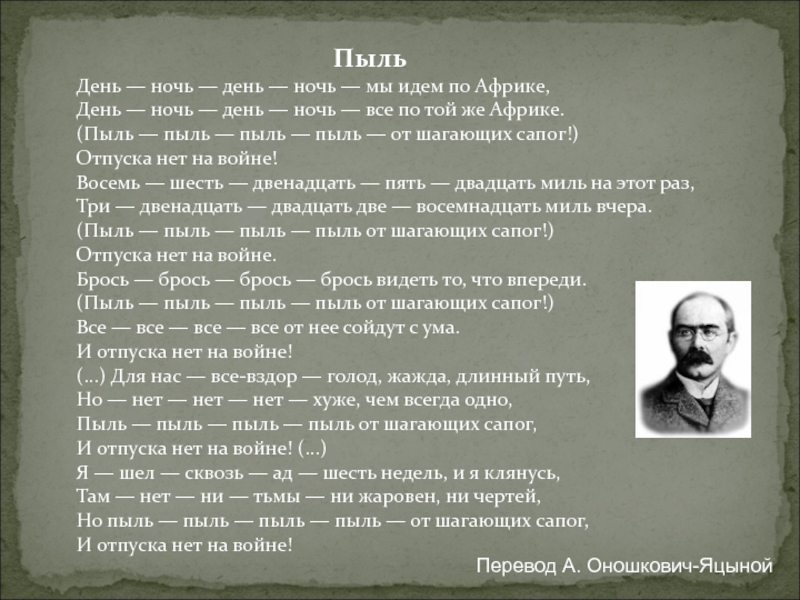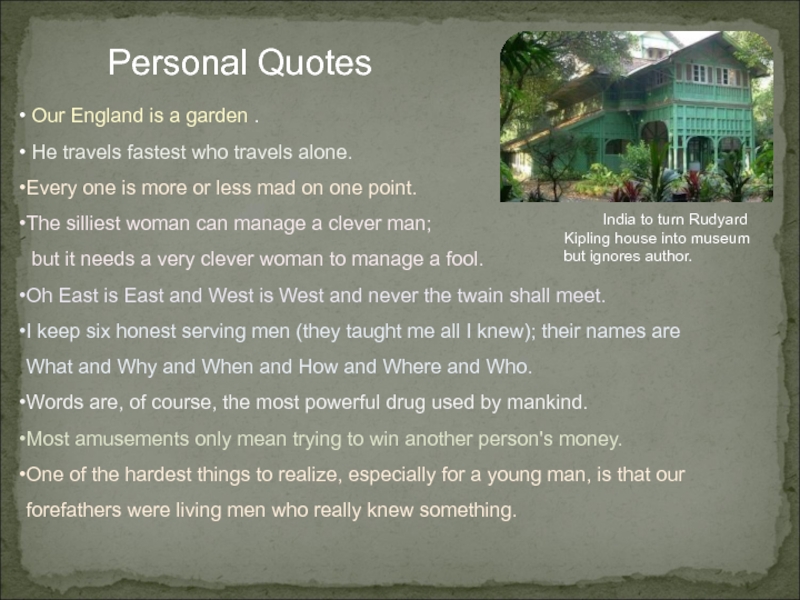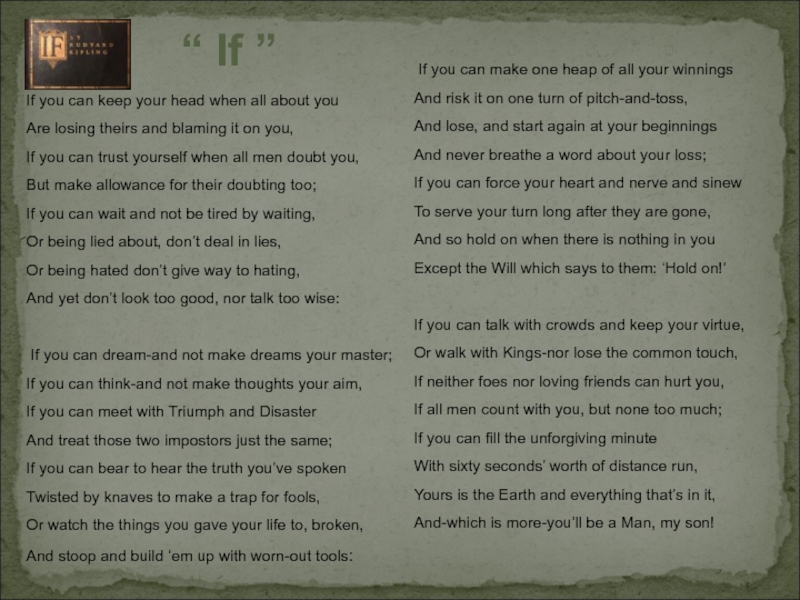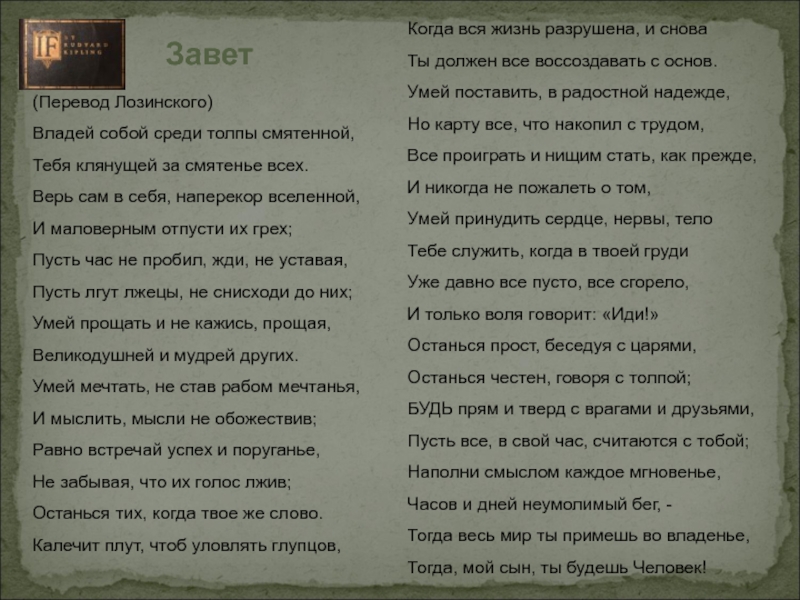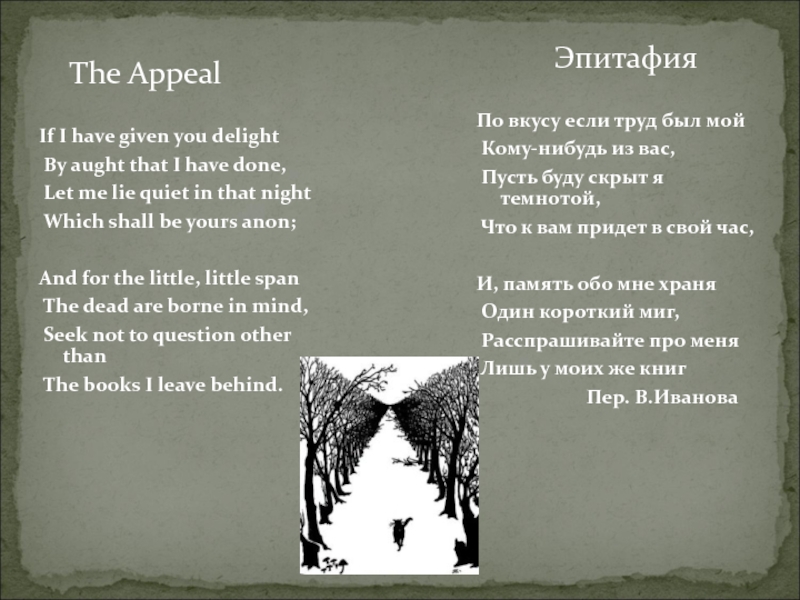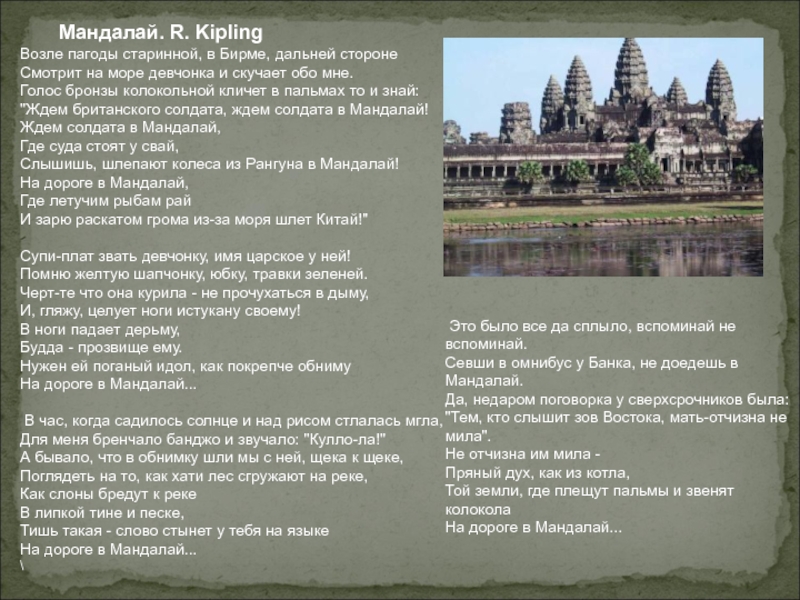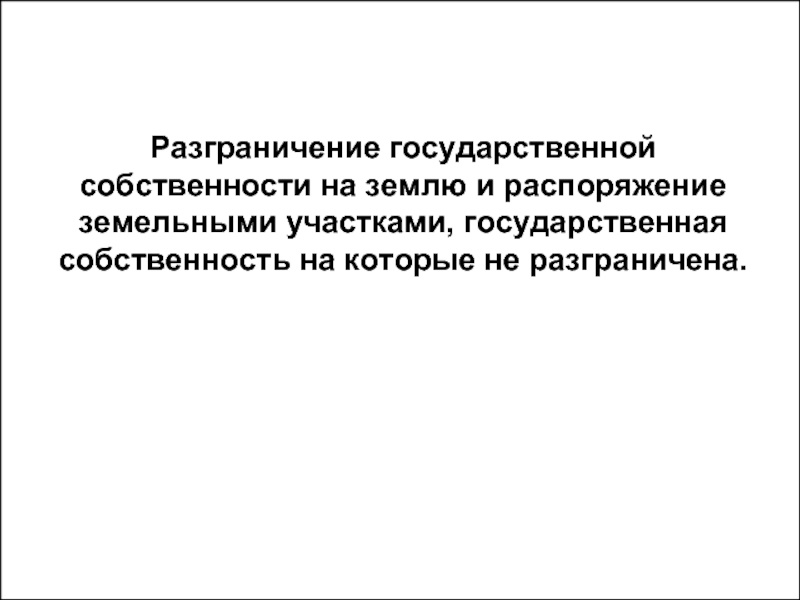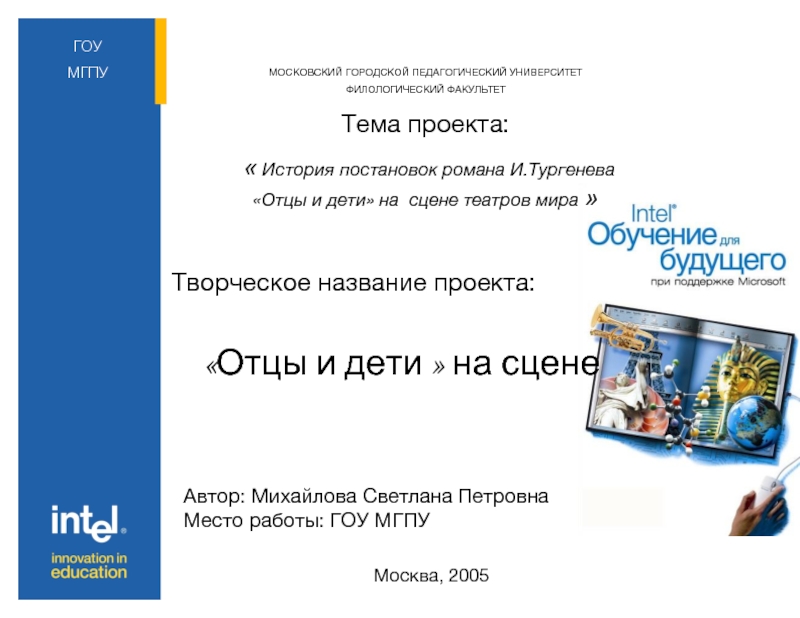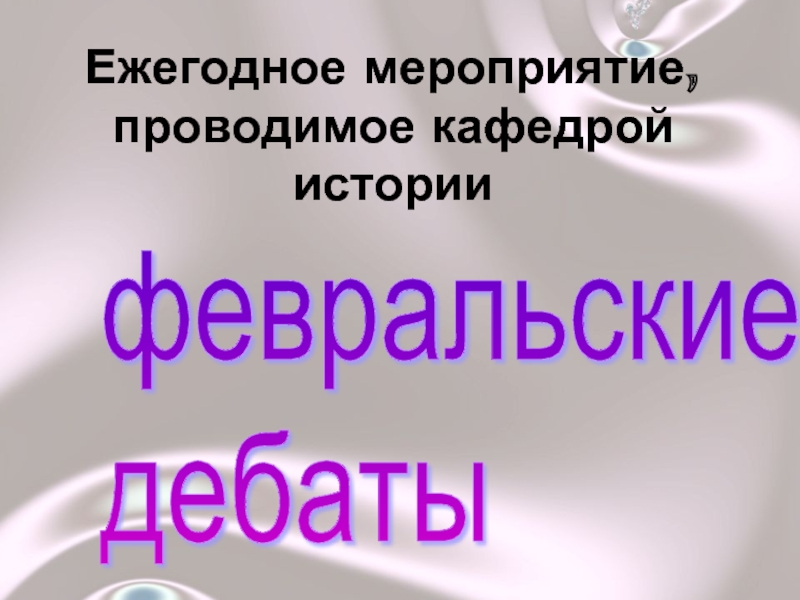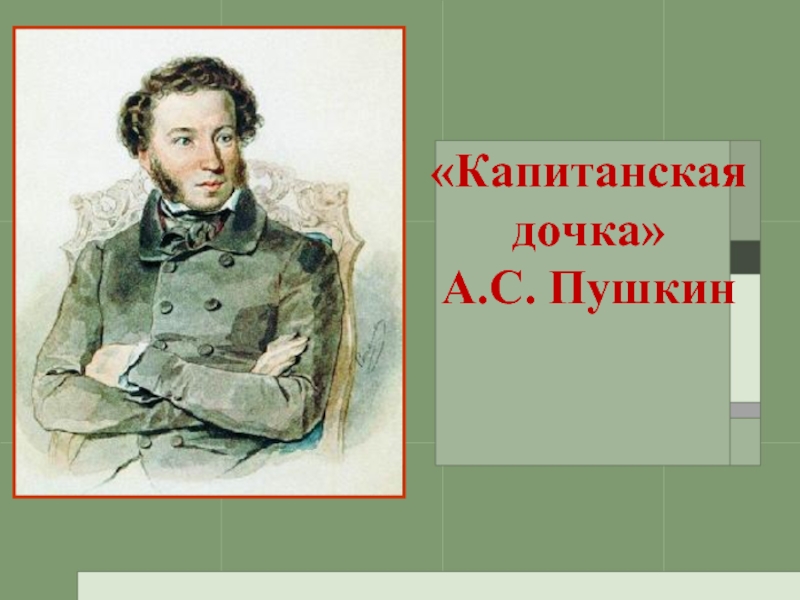- Главная
- Разное
- Дизайн
- Бизнес и предпринимательство
- Аналитика
- Образование
- Развлечения
- Красота и здоровье
- Финансы
- Государство
- Путешествия
- Спорт
- Недвижимость
- Армия
- Графика
- Культурология
- Еда и кулинария
- Лингвистика
- Английский язык
- Астрономия
- Алгебра
- Биология
- География
- Детские презентации
- Информатика
- История
- Литература
- Маркетинг
- Математика
- Медицина
- Менеджмент
- Музыка
- МХК
- Немецкий язык
- ОБЖ
- Обществознание
- Окружающий мир
- Педагогика
- Русский язык
- Технология
- Физика
- Философия
- Химия
- Шаблоны, картинки для презентаций
- Экология
- Экономика
- Юриспруденция
Joseph Rudyard Kipling (December 30, 1865 - January 18, 1936) презентация
Содержание
- 1. Joseph Rudyard Kipling (December 30, 1865 - January 18, 1936)
- 2. Born Joseph Rudyard Kipling 30 December
- 3. Kipling's Childhood Joseph Rudyard Kipling was a
- 4. He succeeded in writing short
- 5. In 1892 he married Caroline
- 6. Stories for Little Children and Adults
- 7. Mowgli, how R. Kipling saw him.
- 8. Six serving men I have six honest
- 9. WAR R.Kipling is known not
- 10. Boots
- 12. Our England is a garden .
- 13. At the beginning
- 14. In 1907 he received the
- 15. If you can keep your head
- 16. Завет (Перевод Лозинского) Владей собой среди толпы
- 18. Мандалай. R. Kipling
- 19. Редьярд Киплинг 1865 -
- 20. Презентация подготовлена Учителем английского языка
Слайд 2Born Joseph Rudyard Kipling
30 December 1865
Bombay, India
Died 18 January 1936 (aged
Middlesex Hospital, London, England
Occupation Short story writer, novelist, poet, journalist
Nationality British
Genres Short story, novel, children's literature, poetry, travel literature, science fiction
Notable work(s) The Jungle Book, Just So Stories , Kim, If—, Gunga Din
Notable award(s) Nobel Prize in Literature in 1907
Слайд 3Kipling's Childhood
Joseph Rudyard Kipling was a famous British author and poet.
Kipling was born in Bombay, India. His father was John
Lockwood Kipling, a teacher at the local Jeejeebhoy School of Art,
and his mother was Alice Macdonald. They are said to have met at Rudyard Lake in Staffordshire, England, hence Kipling's name. From the ages of six to twelve young Kipling and his sister spent much time in England with their aunt and uncle , while his parents remained in India.
At the age of 6 he went to boarding school, but Kipling was very unhappy there . He became ill and his mother took him to United Services College at Westward Ho, North Devon. By 1880, he returned to Lahore, (in modern-day Pakistan) India where he began writing as a sub-editor for "The Civil and Military Gazette". He was just seventeen and he began tentative steps into the world of poetry.
30 December 1865 – 18 January 1936
Слайд 4 He succeeded in writing short stories. Kipling's first prose
On 9 March 1889, Kipling left India, travelling first to Singapore, Hong Kong and Japan. He then travelled through the United States up into Canada. After that he crossed the Atlantic, and reached Liverpool in October 1889. So he made his way to London, the centre of the literary universe in the British Empire. But in 1891, on the advice of his doctors, Kipling made another sea voyage visiting South Africa, Australia, New Zealand and once again India.
The building on Villiers Street off the Strand in London where Kipling rented rooms from 1889 to 1891
Travelling
Слайд 5 In 1892 he married Caroline Balestier, the daughter of
His first two children, Josephine and Sussex, were born there. When they were little, he told them tales which he made up himself. Later he published these tales in “The Jungle Book “ and “The Second Jungle Book” , and children in many countries like them very much. Many people know his book about Mowgli, a little Indian boy, who lived in the jungle with the wolves.
Naulakha, in Dummerston, Vermont ,
Rudyard Kipling's house, as it looks today.
http://en.wikipedia.org/wiki/Rudyard_Kipling
"Naulakha"
Слайд 6Stories for Little Children and Adults
In 1902 his
Слайд 8Six serving men
I have six honest serving men.
They taught me all
I send them over land and sea, I send them east and west, But after they have worked for me I give them all a rest. /…/
But different folks have different views. I know a person small. She keeps ten million serving men Who get no rest at all.
She send them on her own affairs From the second she opens her eyes — One million Hows, two million Wheres And seven million Whys.
Шестерка слуг
Есть у меня шестерка слуг,
Проворных, озорных.
И все, что вижу я вокруг, все
Знаю я от них.
Они по зову моему
Являются в нужде.
Зовут их Как? и Почему?
Кто? Что? Когда? и Где?
Я по горам и по лесам
Гоняю верных слуг.
Потом работаю я сам,
А им даю досуг. (...)
Но у меня есть милый друг –
Особа юных лет.
Ей служат сотни тысяч слуг,
И всем покоя нет.
Она гоняет как собак
В ненастье, дождь и тьму
Пять тысяч Где? семь тысяч Как?
Сто тысяч Почему?
Слайд 9WAR
R.Kipling is known not only as a shot-story writer
Bundi, Rajputana,
where Kipling was inspired to write Kim.
The Battle of Majuba hill. Anglo Boer War in South Africa.
Слайд 10 Boots
Р. Киплинг (1914)
We’re foot—slog—slog—slog—sloggin' over
Foot—foot—foot—foot—sloggin' over Africa —
(Boots—boots—boots—boots—movin' up an' down again!)
There's no discharge in the war!
Seven—six—eleven—five—nine-an'-twenty mile to-day —
Four—eleven—seventeen—thirty-two the day before —
(Boots—boots—boots—boots—movin' up an' down again!)
There's no discharge in the war!
Don’t—don’t—don’t—don’t—look at what’s in front of you.
(Boots—boots—boots—boots—movin' up an' down again);
Men—men—men—men—men go mad with watchin' em,
An' there's no discharge in the war!
Try—try—try—try—to think o' something different —
Oh—my—God—keep—me from goin' lunatic!
(Boots—boots—boots—boots—movin' up an' down again!)
There's no discharge in the war!
Слайд 11
День — ночь — день — ночь — мы идем по Африке, День — ночь — день — ночь — все по той же Африке. (Пыль — пыль — пыль — пыль — от шагающих сапог!) Отпуска нет на войне! Восемь — шесть — двенадцать — пять — двадцать миль на этот раз, Три — двенадцать — двадцать две — восемнадцать миль вчера. (Пыль — пыль — пыль — пыль от шагающих сапог!) Отпуска нет на войне. Брось — брось — брось — брось видеть то, что впереди. (Пыль — пыль — пыль — пыль от шагающих сапог!) Все — все — все — все от нее сойдут с ума. И отпуска нет на войне! (...) Для нас — все-вздор — голод, жажда, длинный путь, Но — нет — нет — нет — хуже, чем всегда одно, Пыль — пыль — пыль — пыль от шагающих сапог, И отпуска нет на войне! (...) Я — шел — сквозь — ад — шесть недель, и я клянусь, Там — нет — ни — тьмы — ни жаровен, ни чертей, Но пыль — пыль — пыль — пыль — от шагающих сапог, И отпуска нет на войне!
Перевод А. Оношкович-Яцыной
Слайд 12 Our England is a garden .
He travels fastest who
Every one is more or less mad on one point.
The silliest woman can manage a clever man;
but it needs a very clever woman to manage a fool.
Oh East is East and West is West and never the twain shall meet.
I keep six honest serving men (they taught me all I knew); their names are What and Why and When and How and Where and Who.
Words are, of course, the most powerful drug used by mankind.
Most amusements only mean trying to win another person's money.
One of the hardest things to realize, especially for a young man, is that our forefathers were living men who really knew something.
Personal Quotes
India to turn Rudyard Kipling house into museum but ignores author.
Слайд 13 At the beginning of World War I,
Слайд 14 In 1907 he received the first Nobel Prize in
Rudyard Kipling's grave, Poet's Corner, Westminster Abbey.
Слайд 15
If you can keep your head when all about you
Are losing
If you can trust yourself when all men doubt you,
But make allowance for their doubting too;
If you can wait and not be tired by waiting,
Or being lied about, don’t deal in lies,
Or being hated don’t give way to hating,
And yet don’t look too good, nor talk too wise:
If you can dream-and not make dreams your master;
If you can think-and not make thoughts your aim,
If you can meet with Triumph and Disaster
And treat those two impostors just the same;
If you can bear to hear the truth you’ve spoken
Twisted by knaves to make a trap for fools,
Or watch the things you gave your life to, broken,
And stoop and build ‘em up with worn-out tools:
If you can make one heap of all your winnings
And risk it on one turn of pitch-and-toss,
And lose, and start again at your beginnings
And never breathe a word about your loss;
If you can force your heart and nerve and sinew
To serve your turn long after they are gone,
And so hold on when there is nothing in you
Except the Will which says to them: ‘Hold on!’
If you can talk with crowds and keep your virtue,
Or walk with Kings-nor lose the common touch,
If neither foes nor loving friends can hurt you,
If all men count with you, but none too much;
If you can fill the unforgiving minute
With sixty seconds’ worth of distance run,
Yours is the Earth and everything that’s in it,
And-which is more-you’ll be a Man, my son!
“ If ”
Слайд 16Завет
(Перевод Лозинского)
Владей собой среди толпы смятенной,
Тебя клянущей за смятенье всех.
Верь сам
И маловерным отпусти их грех;
Пусть час не пробил, жди, не уставая,
Пусть лгут лжецы, не снисходи до них;
Умей прощать и не кажись, прощая,
Великодушней и мудрей других.
Умей мечтать, не став рабом мечтанья,
И мыслить, мысли не обожествив;
Равно встречай успех и поруганье,
Не забывая, что их голос лжив;
Останься тих, когда твое же слово.
Калечит плут, чтоб уловлять глупцов,
Когда вся жизнь разрушена, и снова
Ты должен все воссоздавать с основ.
Умей поставить, в радостной надежде,
Но карту все, что накопил с трудом,
Все проиграть и нищим стать, как прежде,
И никогда не пожалеть о том,
Умей принудить сердце, нервы, тело
Тебе служить, когда в твоей груди
Уже давно все пусто, все сгорело,
И только воля говорит: «Иди!»
Останься прост, беседуя с царями,
Останься честен, говоря с толпой;
БУДЬ прям и тверд с врагами и друзьями,
Пусть все, в свой час, считаются с тобой;
Наполни смыслом каждое мгновенье,
Часов и дней неумолимый бег, -
Тогда весь мир ты примешь во владенье,
Тогда, мой сын, ты будешь Человек!
Слайд 17
Эпитафия
По вкусу если труд был мой
Пусть буду скрыт я темнотой,
Что к вам придет в свой час,
И, память обо мне храня
Один короткий миг,
Расспрашивайте про меня
Лишь у моих же книг
Пер. В.Иванова
The Appeal
If I have given you delight
By aught that I have done,
Let me lie quiet in that night
Which shall be yours anon;
And for the little, little span
The dead are borne in mind,
Seek not to question other than
The books I leave behind.
Слайд 18 Мандалай. R. Kipling
Возле пагоды старинной, в Бирме,
Смотрит на море девчонка и скучает обо мне.
Голос бронзы колокольной кличет в пальмах то и знай:
"Ждем британского солдата, ждем солдата в Мандалай!
Ждем солдата в Мандалай,
Где суда стоят у свай,
Слышишь, шлепают колеса из Рангуна в Мандалай!
На дороге в Мандалай,
Где летучим рыбам рай
И зарю раскатом грома из-за моря шлет Китай!"
Супи-плат звать девчонку, имя царское у ней!
Помню желтую шапчонку, юбку, травки зеленей.
Черт-те что она курила - не прочухаться в дыму,
И, гляжу, целует ноги истукану своему!
В ноги падает дерьму,
Будда - прозвище ему.
Нужен ей поганый идол, как покрепче обниму
На дороге в Мандалай...
В час, когда садилось солнце и над рисом стлалась мгла,
Для меня бренчало банджо и звучало: "Кулло-ла!"
А бывало, что в обнимку шли мы с ней, щека к щеке,
Поглядеть на то, как хати лес сгружают на реке,
Как слоны бредут к реке
В липкой тине и песке,
Тишь такая - слово стынет у тебя на языке
На дороге в Мандалай...
\
Это было все да сплыло, вспоминай не вспоминай.
Севши в омнибус у Банка, не доедешь в Мандалай.
Да, недаром поговорка у сверхсрочников была:
"Тем, кто слышит зов Востока, мать-отчизна не мила".
Не отчизна им мила -
Пряный дух, как из котла,
Той земли, где плещут пальмы и звенят колокола
На дороге в Мандалай...
Слайд 19Редьярд Киплинг 1865 - 1936
Синие розы - Р.
Перевод стиха "Синие розы“
- Валерий Луккарев
Я алые, белые розы в букет
Сложил для любимой, но радости нет ...
Любовь, подскажи, как тебе угодить?
"Я синие розы хочу получить".
Весь мир обойти не сочту я за труд,
Узнаю, где синие розы растут.
Но всюду смеялись, услышав вопрос,
"Таких, отродясь, не видали мы роз".
Домой возвратившись морозной зимой,
Глупышки-любви не застал я живой.
С последним дыханьем, у смерти из рук
Всё синие розы просила, мой друг
Но может быть там, за могильной плитой
Нашла она то, что хотелось самой?
Да, зря я весь мир был объездить готов -
Нет лучше на свете обычных цветов ...
